The Trojan War is probably the greatest war in classical mythology, and it is one of the most famous stories ever told (most famous in Homer's "Iliad"). The Trojan War was a mythological battle in western Anatolia between the early Greeks and the people of Troy, which later Greek writers dated to the 12th or 13th century BCE. The conflict triggered the imagination of the ancient Greeks more than any other event in their history. Homer's Iliad and Odyssey commemorated it, and several other early works are now lost and often offered by the great playwrights of the classical age. It also appears in Roman (eg Virgils Aeneiden) and later folk literature up to our time.
Background
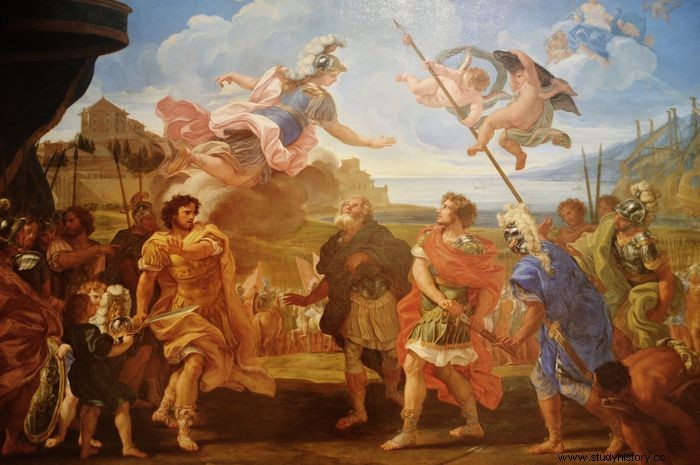
The origins of the Trojan War can be traced back to a divine love match and a prophecy about the basic foundations of the Olympic Order. Both the gods Zeus and Poseidon fell in love with a beautiful sea nymph named Thetis decades before the story began. Fate predicted that the sea-goddess would give birth to a prince's son who would be stronger than his father and use a weapon that was more formidable than the thunderbolt or the irresistible wooden fork. If she slept with Zeus or one of his brothers, they both withdrew after hearing the serious implications of such behavior (either from Themis or Prometheus). Zeus planned to marry Thetis to King Peleus, "the most pious man who lived on the plain of Iolcus", to ensure that nothing went wrong.
The Apple of Tension
Now that the man was determined, Zeus prepared a lavish feast in honor of Peleus and Thetis' marriage, to which all the other gods were invited except Eris, the annoying goddess of conflict. She tossed her gift among the visitors, annoyed at being stopped at the threshold of Hermes. It is Discorden's apple, a golden apple in which the words "for the most beautiful" were engraved. Soon after, Hera, Athena, and Aphrodite began to quarrel over who should have the apple and, without being able to decide on their own, asked Zeus to judge the case.
Paris Appeals
Realizing that making a decision would upset at least two goddesses, Zeus carefully chose not to make a decision. Instead, he appointed Paris, the youthful prince of Troy, as judge. The three goddesses met Paris while tending his sheep on Mount Ida. Even after seeing each of the three goddesses naked, he could not make a decision. As a result, it was time for some bribery. First, Hera told Paris that she would give him political power and the Asian throne in exchange for his election. After that, Athena promised him wisdom and superior war skills. Finally, Aphrodite Paris promised Helen from Sparta, the most beautiful woman in the world. There was only one outcome. Without hesitation, Paris gave the apple to Aphrodite, rejected the prophecies of Helenus and Cassandra, and went to Sparta to collect the reward and start the Trojan War.
The suitors of Helen and Tyndareus' oath
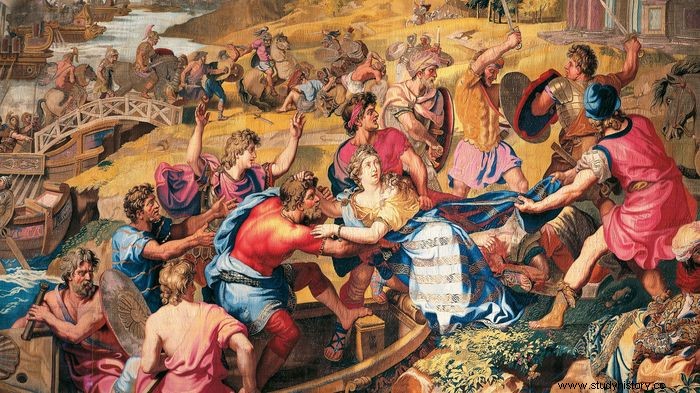
Now Aphrodite was not the only one who thought Helen, King Tyndareus of Sparta's stepdaughter, was the most beautiful lady. Tyndareus' court had been flooded with aristocratic suitors ever since the announcement of her availability for marriage months before the Paris ruling. But, like Zeus in the case of the Apple of Disagreement, Tyndareus did not want to create political enemies, so he postponed choosing the groom.
Finally, the wisest - and least enthusiastic - of the suitors, Odysseus of Ithaca, presented an escape plan in return for Penelope, Tyndareus' niece. The king agreed, and Odysseus urged him to get all of Helen's suitors to sign a pledge to protect the couple no matter what the final decision was. After taking the oath, Tyndareus Menelaos chose to marry his daughter, which essentially made him the successor to the Spartan throne through Helen.
The kidnapping of Helen
Unfortunately for Menelaus, his uncle Catreus, king of Crete, was mistakenly murdered by one of his sons shortly after his marriage to Helen was formalized. While Menelaus was away for the funeral, Aphrodite took the opportunity to disguise Paris as a diplomatic envoy and smuggle him into the palace of the Spartan royal family. Thanks to the influence of the goddess and one of Eros' unmistakable arrows, Helen enthusiastically embraced Paris. She agreed to run with him to Troy after a night of passion and promise.
The formation of the army
Menelaus came home and soon discovered that his wife had left him - and for a poorer guy. So he did not waste time, invoking the oath of Tyndareus and enlisting the help of all the Achaean chiefs who had previously sought Helen's hand with him, urged by his much more powerful brother, Agamemnon. And they all came, each in command of a formidable army.
Odysseus' recruitment
Odysseus was the happily married father of a one-year-old boy named Telemachus. He was told by viewer Halitherses that he would be gone for many years if he joined the Trojan expedition. So when the envoy arrived in Ithaca, he seemed to be mad at plowing his fields with a donkey and an ox and spreading salt instead of grain.
Palamedes for his part looked through the trick and placed Telemachus in front of the plow. Odysseus had no choice but to change direction, revealing both his plan and his intellect. Accepting his fate - and knowing that his presence was crucial to Greek victory, according to viewer Calchas - Odysseus set out on a mission to find and register Achilles, the greatest of all Greek heroes under Troy.
Achilles - The Demon!
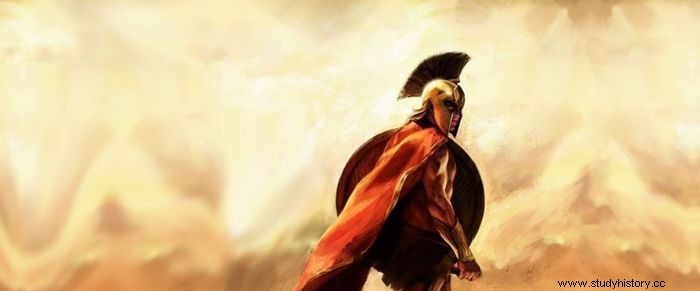
Achilles was the only surviving son of Peleus and Thetis and the child Zeus and Poseidon had wanted. Achilles' mother knew from the moment he was born that he would either have an imperceptible but long life, or a great life that would end in his death young on the battlefield. Fearing for his son's safety in the future, Thetis gave him immortality. She led him to the river Styx, one of the rivers that flowed through the underworld. There she dipped him in the water to make him invulnerable when he was still a baby.
On the other hand, Thetis was unaware that the boy's heel, which she had seized, did not touch the water in Styx. It would later prove Achilles' death and is the origin of the modern term "Achilles heel", which refers to a vulnerable place despite general strength. After completing the process, Thetis disguised Achilles as a girl and hid him among the virgins at King Lycomedes' court of Skyros to be safe.
Achilles' recruitment
Odysseus learns about Achilles' whereabouts shortly after joining the Trojan War. He connected with Telamonian Ajax and Phoenix, Achilles' old teacher, and the three-headed Skyros to recruit the hero. They either blew a battle horn, and made Achilles take a spear in his hand, or they pretended to be merchants selling gems and weapons, with Achilles as the only woman interested in the latter. In any case, the Akai forces were now fully assembled and ready to invade Troy.
Getting to Troy
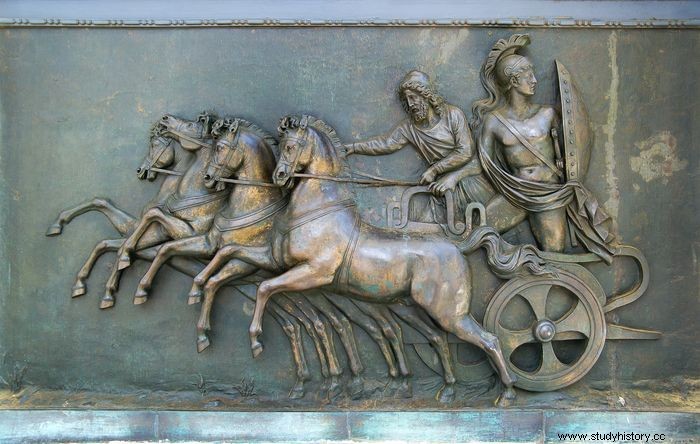
The Achaean leaders first gathered at Aulis' pier. Apollo offered a sacrifice, and the deity sent a warning. A snake slipped from the altar and ate the mother and her nine babies before they were turned to stone. Viewer Calchas explained the significance of the event to everyone. Troy would eventually fall, but not before the tenth year of the war!
Telephus
The Achaeans immediately set sail for Troy for the Trojan War, even though no one knew where they were going. As a result, they landed in the kingdom of Mysia, ruled by King Telephus, by accident. In addition to killing countless mystics, Achilles (who was only fifteen at the time!) Managed to harm their king Telefhus, a son of Heracles, in the ensuing conflict, which highlighted Achilles' extraordinary strength. And as Telephus learned from an oracle shortly after the Acacia ships sailed away from Mysia, this wound was so peculiar that it could only be healed by the one who had caused it.
Telephus searched for Achilles for eight years, and finally found him in Aulis, where the Akai chiefs had gathered for a new meeting, despairing over their inability to reach Troy. Achilles knew little about medicine, so he was surprised when Telephus approached him with prayer. Odysseus was always wise that the prophecy might not apply to the man - but the weapon that had inflicted the wound. Achilles, on his advice, scraped the rust off Pelian's spear over Telephus' wounds. It stopped bleeding immediately. Telephus volunteered to inform the Greeks of the road to Troy as a sign of his thanks.
Aulis' Iphigenia
However, the Greeks now faced an even bigger problem. While they knew the route to Troy, they could not sail from Aulis because there was no wind, let alone favorable wind, most of the time. Calchas, a seer, deduced that this was retaliation from the goddess Artemis, who was furious at Agamemnon for killing a sacred deer. The sacrifice of Agamemnon's virgin daughter, Iphigenia, was Artemis' unimaginably strong demand for reconciliation.
After some thought, Odysseus lures Iphigenia to Aulis under the guise of marriage to Achilles. Achilles tried to spare Iphigenia's life after learning that he had been deceived, only to discover that all the other Greek leaders and warriors favored the sacrifice. Iphigenia cautiously accepted her fate and placed herself on the altar, running out of alternatives. Some report that just as Calchas was about to sacrifice her, Artemis replaced Iphigenia with a deer and carried her to Tauris, where she became the goddess's high priestess.
Tenedos
After the sacrifice, the wind picked up again, and the Akai fleet was finally able to sail towards Troy for Trojan War. But unfortunately, they attacked the island of Tenedos on their way there, and Achilles killed the island's monarch, Tenes, who happened to be a son of the deity Apollo, unaware of his true nature. It was a fateful decision because Thetis had warned him not to kill any of the sons of Apollo if the deity himself were to kill him. As prophesied, Apollo would demand his retribution many years later.
Battle of Troy
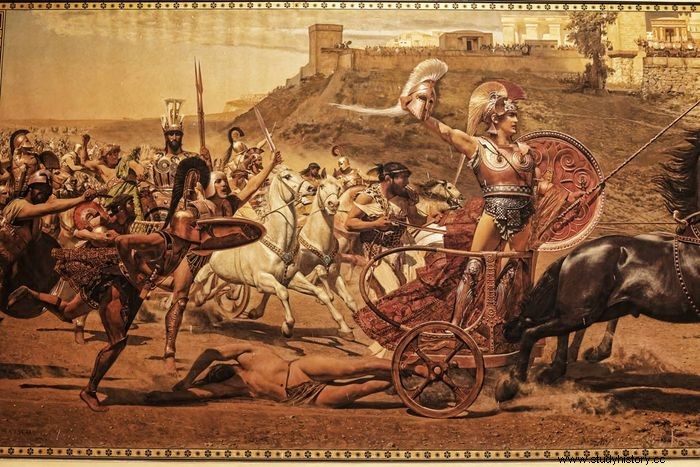
The Greeks sent a diplomatic delegation to Troy, consisting mainly of Menelaus and Odysseus. However, some sources claim that Acamas and Diomedes were also present to reunite Helen peacefully. The Trojans not only refused, but also threatened to kill the emissary, and only the Trojan elder, Antenor's intervention, saved the lives of Menelaus and Odysseus. The message was clear - if the Greeks wanted Helen back, they would have to bring weapons.
Protesilaus
After many years of hiking, the Greek navy sailed the short voyage from Tenedos to Troas and arrived at its intended destination. However, everyone was on guard against landing because an oracle had said that the first Greek to set foot on Trojan land would be the first to die in the battle. Others suggest that Protesilaus was deceived by Odysseus, who declared that he would travel first, but then avoided prophecy by stepping on his shield once ashore. In any case, Protesilus had the misfortune of being the first victim of the Trojan War, and died in a face-to-face battle with Troy's most famous hero, its beloved prince, Hector.
The siege of Troy for nine years
The siege of Troy lasted for nine years, but the Trojans persevered, thanks to their ability to establish trade relations with other Asian cities and constant reinforcements. Finally, the weary Achaean army revolted and tried to return home towards the end of the ninth year. However, Achilles strengthened their confidence and persuaded them to stay a little longer.
Achilles rage
Chryses, a Trojan priest from Apollo, came to Agamemnon in the tenth year and asked for the return of his daughter Chryseis. Agamemnon refused to return Chryseis, whom he had obtained as a booty and kept as his mistress. So Chryses appealed to Apollo for divine retaliation, and Apollo sent a disease over the Greek troops. Eventually, Agamemnon was forced to restore Chryseis to her father by his forces. But to save his ego and reputation, he accepted Achilles' concubine Briseis as his own. Furious, Achilles returned to the cabin and said he would no longer fight - at least not as long as Agamemnon was in command.
Patroclus
When Achilles was no longer in the picture, the Trojans began to win battle after battle, forcing the Greeks back to their ships and almost setting them on fire. Eventually, Patroclus, Achilles' closest friend, could not stand it any longer and asked Achilles for his armor, then took command of the Myrmidon army while dressed like him. The Achaeans repulsed the Trojan war. Hector, who was always the fearless warrior and never shyed away from a duel, barely saved a moment before he asked in the direction the man everyone assumed was Achilles. In the ensuing battle, Hector managed to kill the opponent - only to discover that it was Patroclus.
The triumphant return of Achilles
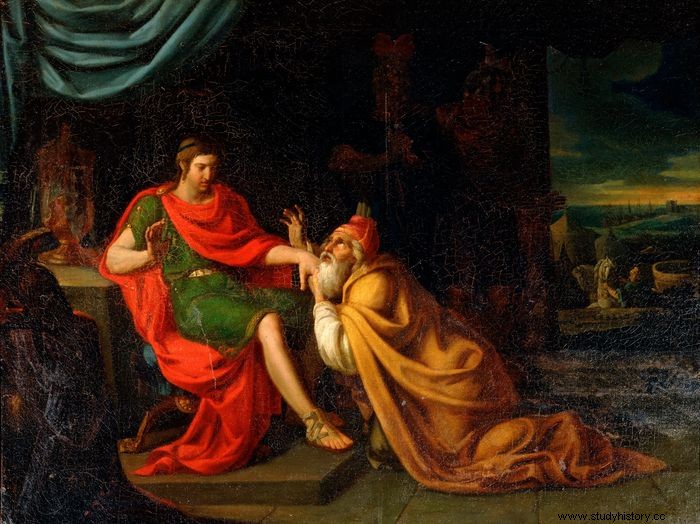
Furious over his grief, Achilles promised revenge, and the battle changed after he returned to the battlefield. Achilles finally got the fight he wanted after slaughtering many Trojans. The mighty Hector himself! Although this duel pitted the best fighter jets from both armies against each other, everyone knew there could only be one victory. Hector had already said goodbye to his wife Andromache and his little son Astyanax, fully aware of the opponent's demigod status. After killing Hector, Achilles refused to give the body to the Trojans for burial. Instead, he desecrated it by carrying it in front of the city walls in his chariot. He finally decided to return it after being moved to tears by the arrival of King Priam. He came alone to the Greek camp to beg for his son's corpse with his son's killer.
Achilles' last days
After these events, Achilles was hit in the heel by an arrow launched by Paris and directed by Apollo as he tried to enter Troy. His bones were then combined with his close friend Patroclus and burned at a funeral bonfire. After that, Paris was murdered by an arrow fired by Philoctetes straight from Heracles' famous arch.
The Trojan Horse
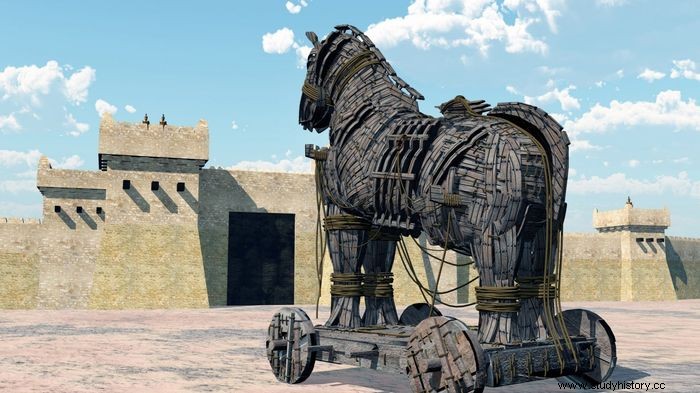
Several other heroes died in the days that followed. Finally, Odysseus developed a strategy to end the war. He asked for the construction of a wooden horse with a hollow belly. Soldiers hid inside the horse before being wheeled in front of Troy's city gates. Meanwhile, the Greek navy went to Tenedos, a nearby island, leaving a double agent named Sinon. Sinon persuaded the Trojans, after some debate, that the Greeks had gone and that the Trojan horse was a divine gift that would bring Troy much luck. Despite warnings from Apollo's priest Laocoon and prophetess Cassandra, the Trojans insisted on bringing the horse into the city. They began to celebrate and celebrate the victory after that. The Greek ships went back all night, and the troops hidden in the horse ran out and opened the gates. After a massacre, Troy fell after a decade-long conflict.
Trojan Wars
The Greeks raided the city, set fire to most things, destroyed temples and sacred sites, and committed offense after offense against the Olympic gods. Odysseus either enslaved Queen Hecuba or she became insane after seeing the bodies of many of her children, while King Priam was cruelly killed by Achilles' son Neoptolemus. A daughter, Polyxena, was sacrificed at Achilles' grave. At the same time, another, Cassandra, was pulled from the Temple of Athena and abused by Locrian Ajax in a crime so heinous that the statue of the goddess turned away in fear. Finally, in perhaps the most cruel act of all, Neoptolemus or Odysseus threw Hector's little son, Astyanax, from the walls of Troy to his death. Aeneas was one of the few heroes who survived the slaughter and continued to build the first Roman dynasty in Italy.
The aftermath
The gods rarely forgive and never forget. The remaining Greek heroes will discover this the hard way. Most of them will be brutally punished for their sins despite the victory. Only a select few will ever return home - and only after countless adventures and ventures. Even fewer will be warmly welcomed. The majority are either banished to oblivion or die at the hands of their loved ones. Or both, in some situations.
the conclusion
The Trojan War influenced and shaped how the ancient Greek civilization was looked forward to the twenty-first century AD. As a result, the story of gods and heroic warriors is one of the sources of the finest surviving antiquity, and provides insight into the ancient Greek military, religion, customs and attitudes.
